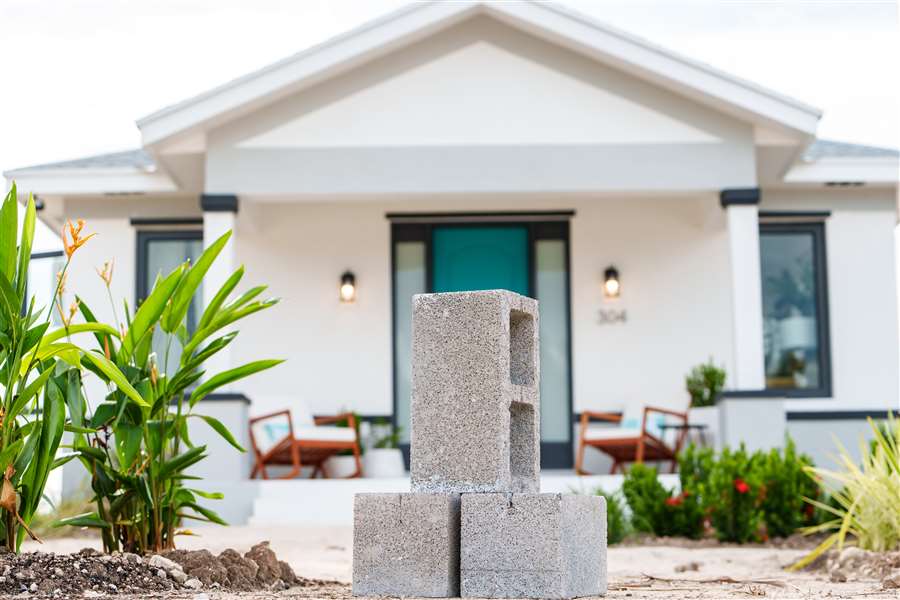In an extraordinary step towards sustainable housing, Partanna Global, the innovative building materials startup, has introduced what is being hailed as the world’s first climate-resilient and carbon-negative home in Nassau, Bahamas. This groundbreaking project represents a remarkable stride in addressing the environmental footprint of traditional construction.
Partanna Global, co-founded by former NBA Lakers legend and actor Rick Fox and Sam Marshall in 2021, is at the forefront of redefining construction methods with sustainability in mind. Their mission is to lead the way in breaking the link between development and pollution, an urgency amplified by the ever-increasing need to construct areas equivalent to the size of The Bahamas every three years.
The ‘Home for the World’ is a 1,250-square-foot residence that actively eliminates and prevents 182.6 metric tonnes of CO2, which is equivalent to the annual carbon absorption of 5,200 mature trees. This remarkable achievement sharply contrasts with the 70.2 metric tonnes of CO2 typically generated by the production of a conventional concrete-built home.
Key to Partanna’s pioneering technology is the replacement of carbon-intensive Portland cement with a blend of natural and recycled materials activated by brine. This unique combination forms chemical compounds that interact with and capture atmospheric CO2, effectively making the home carbon negative.
The construction of this groundbreaking home is based on Partanna’s carbon-negative CMU block, mortar, and pour-in-place technology that supports rebar. A remarkable attribute of this material is its strengthening when exposed to seawater, making it an ideal solution for low-lying coastal communities, which are increasingly vulnerable to rising sea levels and extreme weather events.
According to Partanna, the ‘Home for the World’ not only eliminates but actively removes 182.6 metric tonnes of CO2 from the atmosphere, a feat equivalent to the annual CO2 absorbed by 5,200 mature trees. This starkly contrasts with a standard concrete-built home, which generates 70.2 metric tonnes of CO2 during its production.
This pioneering ‘Home for the World’ is the first among a planned series of 1,000 homes, a project realized through a historic agreement signed at COP27 in partnership with the Bahamian government. Further details concerning the delivery of 29 additional properties and information regarding future production facilities in The Bahamas are expected to emerge in early 2024.

The Honourable Philip E. Davis, K.C., M.P., Prime Minister and Minister of Finance of the Commonwealth of The Bahamas, lauded the innovation, saying, “As we unveil the world’s first carbon-negative concrete home right here in Nassau, it is a testament that the answers to our global crises often come from those most affected. This cement-free marvel not only absorbs CO2 but thrives when exposed to seawater.”
Partanna’s material strength when exposed to seawater is due to its use of brine, a by-product of desalination—a process that plays a pivotal role in providing freshwater supply in areas affected by climate change.
This innovative construction material and approach align with the urgent need for climate-resilient solutions, particularly in regions that face the brunt of climate-related challenges. It presents a beacon of hope for vulnerable communities, such as those in the Caribbean, who are exposed to the impacts of rising sea levels and extreme weather events.
Partanna Global’s pioneering ‘Home for the World’ transcends being just a housing solution. It has garnered recognition from global organizations and has secured its place in the construction industry by meeting global standards for construction materials. Moreover, its carbon-negative concrete showcases superior strength, outperforming traditional alternatives.
With the successful pilot project in the Bahamas, Partanna Global aims to expand its production into the United States, driving a vision of making climate-friendly concrete a mainstream material that can address both the growing global housing demand and the goals of reducing carbon emissions. They are actively seeking strategic partners to catalyze large-scale developments worldwide.
Partanna’s contribution to environmental preservation is further acknowledged as their carbon reduction and avoidance measures have received approval from the world’s largest carbon crediting program, Verra. Each carbon credit represents a metric ton of avoided or removed CO2, underscoring the significance of their carbon-absorbing building materials.
In a world where the impact of extreme weather events and rising sea levels is escalating, Partanna’s innovative construction material, fortified by brine, presents a durable and sustainable alternative. It’s a solution that offers hope for regions at risk from climate-related hazards.
In summary, Partanna Global’s ‘Home for the World’ is a pioneering achievement, marking a significant leap in sustainable housing. It embodies resilience, innovation, and the urgent need to address global crises through bold initiatives that have the power to change the way the world builds-for good.



Comments are closed.